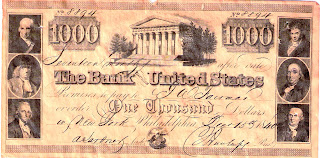I have some apples. Oliver has some oranges. Bob's got a horse cart. Suddenly, I need some oranges. Conveniently, Bob shows up.
"Sorry Bob, you know my policy, no loans."
"I don't want a loan, I have plenty of riches. Look at the paper, it has my special mark on it. I'm the only guy around here rich enough to make fancy marks on paper like that. You can show this piece of paper to every merchant around here and they'll all tell you I'm good for it. They'll tell you I'm rich and have gold hidden in the hills."
"Suuuure. As a matter of fact, I will pay you one orange tomorrow for every apple you give me today."
"That sounds good, Bob. I need some oranges. I'll take your paper, you write down how many apples on it, and you come back tomorrow with the oranges."
"Okay, but here's the thing, is it okay if I write down an amount of gold? I estimate that these apples are worth 100 pieces of gold. How about if I write that down instead?"
"Well, I like oranges, but I also like gold, so that's okay I guess."
Later, Bob meets up with Oliver...
"Hey Oliver, I'll give you ten apples for every eleven oranges you hand over."
"Mister, I got those oranges."
"Cool, lay 'em on me."
Oranges are exchanged for pieces of paper.
"I still don't understand why we need this paper, Bob, I'd feel a lot more comfortable with something useful, like real gold, pigs, or apple pies or something."

"Well, Mister, those papers are my guarantee to you that I'm going to eventually pay for the apples. I used to carry gold, but it was too hard to pull it around in the cart. The wear and tear on the horses was bad. So now I just keep the gold hidden at home, and I hand out paper."
"But how do we know you really have the gold?"
"Well, does it make a difference? The transaction is over, everyone got what they needed, I got a few extra oranges for my troubles, who's complaining?"
"I don't know, Bob, something sounds fishy. How many of these papers are out there in the hands of your customers?"
"A lot."
"Well, I used to."
"WTF, Bob? It's clear from my own initial interaction with you that at the end of our transaction, there was no paper left over. You took it all back, and gave me payment, just like your note promised."
"I paid you what I owed you."
"Sure you did, Bob. And presumably, you took the paper on which you made that promise, and voided it out, indicating that the contract had been satisfied on both sides, and that neither you nor I had any further obligation of payment to the other."
"Well, effectively, yes, I did that."
"What did you really do, Bob?"
"I kept the paper and reused it on another guy. Eventually, enough people were holding my paper that they started to feel very comfortable with it and began trading it amongst themselves. There are even some dudes who make paper like mine in different colors, and they trade my paper for their paper sometimes. Paper has become so popular that no one cares about the gold anymore, so I printed up a whole bunch of it and spread it all around. Now, everyone's forgotten how it used to be. They don't even remember where the paper came from. It was a promise to pay you back. Not anymore."
"What do you mean 'not anymore' ?"
"Like an arbitrary decree? That makes no mathematical sense."
"Yeah, remember our apple orange deal? Apples have value. Apples are worth apples. Oranges have value too, and depending on who you talk to, oranges are worth about one apple."
"Yup, we had a valuable batch or apples and a valuable batch of oranges involved in the equation. Both delicious."
"Right, but nowadays, folks would say that the paper I lent you was valuable too, as valuable as 100 apples."
"That makes no sense. I can't eat it. It won't keep me warm, or give me companionship. I can't use it as a mode of transportation. Also, it take more than a special decree by some arbitrary authority figure to create intrinsic value. No one can just say "You can now eat and be kept warm by paper," and have it be true. What the hell are you talking about, Bob?"
"That's just how it is. It's a subtle thing. People get confused, because there actually is value in the paper, in that it can be used to easily move other value from one place to another, it's a service you can use to transport value through space and time. Like how you moved your apples all the way over to Oliver's Orchard without even leaving your house."
"But you did that."
"Yes, but you paid for it from the value of your apples, and I extracted that payment by taking a few extra oranges from Oliver. He has a surplus anyway. But that amount is much smaller than the promise on the paper itself. See where I wrote "100" on the paper there?"
"Yeah."
"Well, the actual value of the convenience of the transaction - that's the service I provided to you - was only about 10 oranges. Not the #100 that you see on the paper. That's all I could get out of Oliver. But it pays for the horseshoes and the cart maintenance, and I get a little extra for getting drunk on Saturday."
"This is very confusing, Bob. So what is your paper really worth?"
"Nothing. Ten oranges. One hundred Apples. Depends who you ask."
 |
| Bob's Car |







No comments:
Post a Comment